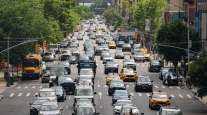Congestion Cost Trucking $33 Billion in 2009 on Wasted Time and Fuel, Study Finds
This story appears in the Jan. 31 print edition of Transport Topics.
Trucks account for only 7% of the miles traveled in the nation’s urban areas but they shoulder 29% of the costs that urban traffic congestion produces annually in wasted time and fuel, according to the annual Urban Mobility Report from the Texas Transportation Institute of Texas A&M University.
Overall, the cost of traffic congestion in urban areas has gone from $24 billion in 1982 to $115 billion in 2009 and trucking’s share of that latest figure is $33 billion, not counting the goods being hauled, the Jan. 20 report said.
Delay times for trucks traveling in the nation’s 15 largest metropolitan areas, the report said, are worst in Chicago, followed by the Los Angeles-Long Beach-Santa Ana, Calif. area and metropolitan New York, New Jersey and Connecticut.
The metro area that converges around Philadelphia, southern New Jersey, Delaware and Maryland ranked fourth in delay time with the fifth place going to the Dallas-Fort Worth-Arlington, Texas area.
When the delay time includes both cars and trucks, the mobility report said, Chicago and the Washington, D.C., metro area tie for first place.
Unlike the cost of congestion for cars, however, the cost of truck congestion “was passed on to consumers in the form of higher prices,” the report said.
In addition, it said, the fallout from truck congestion extends “far beyond the region where the congestion occurs” because trucks carry goods to suppliers, markets, and manufacturers.
Delays in arrival time for manufacturing plants can cause whole production lines to close down, the congestion analysis said.
“The report confirms that congestion has a significant impact on the cost of moving freight, which is ultimately borne by Americans in the form of higher shelf prices, lower incomes and lost jobs,” said Darrin Roth, director of highway operations for American Trucking Associations.
It is past time, Roth said, for the country to make the investments in highway infrastructure that would reduce congestion and, over the long run, pay for themselves.
The same solutions that would alleviate truck congestion, the report said, would also bring overall congestion relief. The solutions include new roads and rail lines, and new lanes on existing roads, lanes dedicated to trucks, and additional lanes and docking facilities at warehouses and distribution centers, the report said.
The recession reduced congestion in 2008 and 2009 because the economic contraction meant fewer cars and trucks were on the road, the report said. However, as economic recovery accelerates, congestion will begin its steady rise again.
Overall congestion in 2009 in urban areas wasted more than 3.9 billion gallons of fuel, which is equal to 130 days of oil flow in the Alaska Pipeline, the report said.




